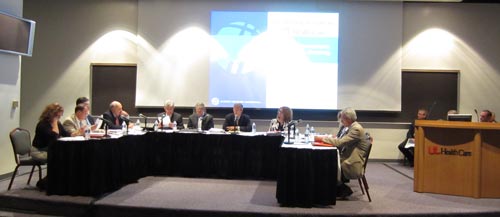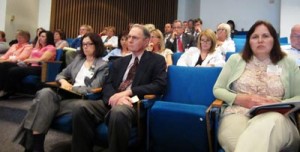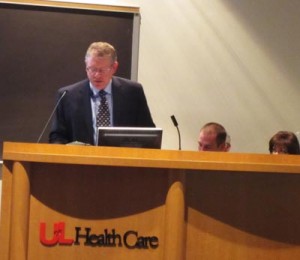Presentation to Hospital Employees and the Public

Because the presentation was essentially identical to that of May 9th, I refer you to my discussion of that meeting which is still on point, and to my final comments in that article which I still hold true.
This final presentation was held in the auditorium of the hospital. The room was appropriately well filled with hospital employees. These were the people who worked with and were interviewed by the consultants, Dixon Hughes Goodman. (DHG). I can’t say there were many members of the general public, if at all. I recognized two other members of the press. A handout with most the slides used is available on the KHPI website (4.8 MB). Some slides, including financial trend information, were used in the presentation but not included in the handout and are available here. An earlier slide comparing University Hospital market share with that of other Louisville hospitals was not presented at all.

Additional Comments Following the Last Meeting:
The consultants were called in to analyze the operational performance of University Hospital to document the beliefs of the Hospital’s leadership and its Board that “the organization’s benefits to the community need to be better understood,” and “to demonstrate their current state operational efficiency and stewardship with the community’s financial resources.” I have a feeling that the Hospital emerged from the process more than a little embarrassed. Its nuts-and-bolts operation of the business aspects of the hospital (labor efficiency, purchasing, billing, etc.) came up average at best. DHG made a number of operational recommendations for improvement. It also appears that my prediction that UofL would hire DHG to help implement those recommendations is coming true.
When DHG looked at the operational and clinical performance of the Hospital’s four premier and most advertised service lines (Emergency Services, Oncology, Trauma Services, & Neurosciences), the “evaluation of these services revealed an overall worse or substantially worse performance rating when compared against its peer organizations.” It is hard to gloss this over. The Hospital and its medical school faculty like to claim quality as a justification for higher payments from insurance companies, or for such things as the location of a new Veterans Hospital downtown. UofL needs to get its house in order before renewing such claims. Saying you are the best does not make it so. (This is true for all hospitals in Louisville!)
UofL Wants a Partner So Bad!
The consultants mention several times the need for UofL to find a partner to improve its chances of success in the future, and to better compete for patients in the Louisville market. This is what UofL wants to hear the most. This is what it told DHG it wants from the start. I have already commented on how such a starting position can determine the end result. The review is said to have arisen from the ashes of the initial attempt to be acquired by Catholic Health Initiatives (CHI). What the University wants most is a partner that will give more money for their academic enterprise. Who needs it more, the Hospital or the Medical School? Those entities are not the same. Despite all the talk about money, the consultants appeared to emphasize more the need for a primary care and referral network to funnel more patients to the Hospital as the major benefit of a new partner relationship. Indeed, the consultants recommend that UofL create an even larger faculty of “non-academic” physicians with a community focus! The discussion and recommendations for improvement appeared to assume that that UofL’s RFP process would be successful. (The nurse sitting next to me assumed it would be CHI or one of their subsidiaries.)
Abandonment of University Hospital by Faculty.
One of the most disappointing things to emerge publicly from the review process was the lack of support for the University’s own faculty for University Hospital. For people who have worked at University Hospital for as long as it has been open, this is an old story. Perhaps this is a legacy from the old Louisville General Hospital that University Hospital replaced. (Anyone who was here then wish to comment?) The University of Louisville School of Medicine has a much larger full-time faculty than comparable medical schools, yet the DHG report states that only 24% of the clinical faculty practice at University Hospital despite financial support from the University for their private practice building. The doctors themselves argue that University Hospital is a suboptimal place to practice, apparently oblivious to the circular argument that it will never get better unless and until they give the Hospital some loyalty. Should not we expect that these full-time employees of a state medical school give their primary allegiance to their own school’s hospital? The consultants stressed over and over that faculty engagement is essential for their recommendations to be effective. What we continue to hear from University leadership is a demand for the same and more research money. (The word “research” was used only once in the final report, and then only as an additional cost burden for teaching hospitals.) I am in hopes this report can provide the muscle to change the relationship of the faculty to their school, but I have my doubts.
Answers To My Questions:
I asked the consultants if University Hospital would be as bad off if the University had not been bleeding off mega-millions for so many years. I did not hear a direct answer. I asked if they had examined what the Hospital was buying from the University every year for their minimum of $75 million. The analysis was not done at that level of detail: the University clearly does not want us to know. I also asked the consultants what happened to the University’s specific request for them to comment on whether the amount of money the Hospital gives for research was appropriate. I was told that that information could not be discussed because of the ongoing RFP process. Can you imagine that! Smacked-down once again!
No attempt at financial accountability.
I am sure that in terms of operations the University and its Hospital will benefit from the consultant’s recommendations and any ongoing participation. In terms of accountability for financial stewardship of the public’s money, the review can say nothing. No financial information that would allow the public to interpret or verify UofL claims was released. Indeed, a point was made early on that such data would not be included with this final report. (In fact none is present.) Money that should have been used for the Hospital to grow its clinical services or for indigent care has been diverted by the University to spend on research, on an ill-conceived failed merger, for repayments of illegally diverted Medicaid money, on unspecified and therefore unjustified University contracts, and who knows what else. I cannot, nor should you, have any sympathy for the University’s claim of insufficient money to run the Hospital under these conditions of accountability blackout. Make the University return some of its own money and get its house in order before asking taxpayers for more. I have not yet seen the evidence that more public money in the system is necessary inn any event. One can only speculate about how successful the Hospital might have been if the University had not interfered with its primary mission so much and for so long. I want to look forward instead of backwards as much as the next person. However, if the University is responsible for the Hospital’s current predicament, let the University be largely responsible for the remedy. I do not think the Community will abandon its hospital, but neither should the Community be anybody’s patsy.
Peter Hasselbacher, MD
President, KHPI.
Emeritus Professor of Medicine, UofL
29 May 2012
Presentation Handout. Full resolution (8.7 MB) or Web-Optimized (4.8 MB)
Slides used not present in Handout.
Case Studies of similar teaching hospitals.
Market Shares in Louisville.
Audio of meeting available on request.
